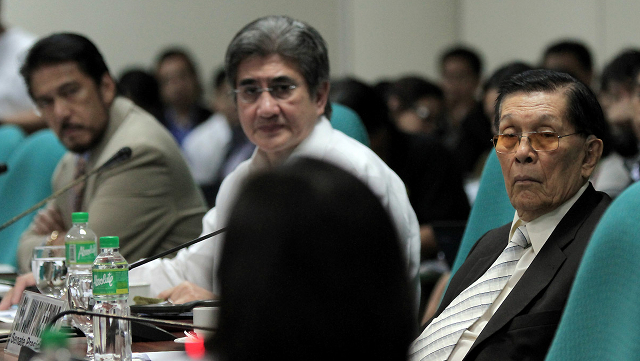SUMMARY
This is AI generated summarization, which may have errors. For context, always refer to the full article.

MANILA, Philippines – With hazing claiming the lives of many students and aspiring lawyers, senators plan to pass a new law but said a total ban might be too drastic.
In a hearing on Wednesday, August 15, Sen Gregorio Honasan, chairperson of the Senate Committee on Public Order and Dangerous Drugs, said that there are too many loopholes in the existing law against hazing.
The Senate is investigating the implementation of the anti-hazing law in light of the deaths of San Beda Law freshmen Marc Andre Marcos, who died last month, and Marvin Reglos, who passed away 5 months ago.
“There will be changes, in fact the Senate President said we need a new law. This will not just be a series of amendments,” Honasan told reporters after the hearing.
Honasan, however, said he does not support some sectors’ calls to totally ban hazing.
“A total ban can be considered but it is too drastic a move. What we want to do here is to calibrate it so we can proceed carefully, slowly but surely so the effect will be long-term,” Honasan said.
Honasan said though that the issue may be a matter of semantics, and clear definitions and standards must be set surrounding the initiation of new members of fraternities and sororities.
‘Title of law misleading’
Present during the hearing was former Senator Jose “Joey” Lina Jr, one of the authors of RA 8049 known as “An Act Regulating Hazing and Other Forms of Initiation Rites.”
Lina admitted that the title of the law is problematic. He said he was no longer in the Senate when the law was being finalized. The law was passed in 1995.
“There were some imperfections in the law like the title, an act regulating hazing which is misleading …. The law is sufficient as a whole but there is no harm if the title is amended, corrected,” Lina said.
Lina also said confusion arises because the law used the words “hazing” and “initiation rites” interchangeably.
Lina, however, said that the problem goes beyond legislation. Former Senator Rene Saguisag of San Beda College, who was a co-author of the law, agreed. Saguisag cited the case of hazing victim Lenny Villa, who was killed in 1991.
“Dalawang dekada na ito, nasa korte pa rin. There must be swiftness and certainty of punishment. Napakabagal ng judiciary.” (The case has been pending before the courts for two decades. The judiciary is so slow.)
Doctors and underground societies
Senate President Juan Ponce Enrile said the law must prohibit physical contact.
Enrile, a member of the UP Sigma Rho Fraternity, said he was not subjected to physical harm during his time. He said he was only made to kneel down and ask for alms, drink an odd concoction, and smoke cigarette.
“You can ask him to kneel, squat for several hours if you want to test the physical stamina but to beat a man, especially lawyers, there’s no point in a lawyer being a criminal himself. He’s supposed to be an apostle of the law. For lawyers to be killers or criminals, they don’t deserve to be lawyers!”
The existing law requires organizations to submit to school authorities an undertaking that no physical violence shall be employed during initiation rotes. This is part of a written notice that fraternities must submit to their schools.
Yet as pointed out by UP Law Professor Theodore Te in a Thought Leaders piece, the law does not provide for a penalty for those who fail to give notice, and no provision mandates that the notice must be approved.
The law requires representatives of the school and organization to be present during the initiation. Enrile and officials of the National Bureau of Investigation suggested that doctors be present as well.
Saguisag, however, said the proposal is problematic.
“We can’t expect the doctor to be present all the while because that’s a violation of his Hippocratic Oath. They don’t allow the most minor injury to be inflicted.”
For the Commission on Higher Education, the law must also include punishment for underground organizations. While fraternities are required to register with their school and submit a list of their officers and members, there are many groups who go underground.
“CHED cannot do anything [if the fraternity is underground] because there is nothing in the law that can penalize organizations underground. There is no legal basis for that,” said CHED Executive Director Julito Vitriolo.
‘Conspiracy of silence’
All the resource persons said that a major difficulty is the culture of silence in fraternities and sororities known as omerta. Police and NBI officials said this makes it hard for witnesses to come forward.
To break this culture, Honasan said many “ingredients or factors” are needed.
“We have to ensure protection of those willing to testify and violate the code of silence in fraternities.”
Honasan said his committee will call for more hearings and will have to study the issue thoroughly.
Enrile could only ask, “What is the point of this culture in society? I’m not against fraternities. That’s a constitutional right [to join organizations] but there’s a limit to these things. Every right is circumscribed by others’ right.” – Rappler.com
Add a comment
How does this make you feel?
There are no comments yet. Add your comment to start the conversation.